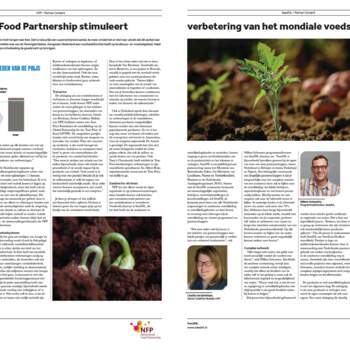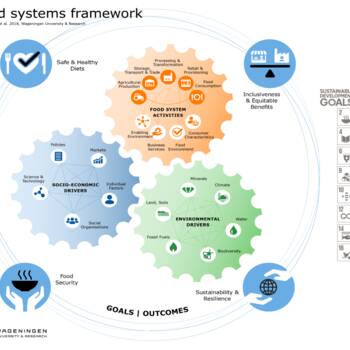In recent years, food systems approaches were developed that aim towards a comprehensive understanding of factors that impact on food security. Food systems approaches require a greater degree of policy coherence to achieve inclusive and sustainable outcomes closely linked to the SDGs. The food systems approach recognizes multi-sectoral dimensions of food security and sustainable and inclusive agricultural development. Food systems analyses have been conducted for a number of countries (e.g. Nigeria) leading to more effective program planning, greater policy coherence and, ultimately, enhanced impact in line with local conditions. [1]
To achieve SDG2 the Netherlands Food Partnership (NFP) was established in 2020. This was a merger of the previous Agri-ProFocus program and the Food and Business Knowledge Platform.
The NFP takes a food systems approach which aims to improve the outcomes of interventions through collaborative efforts of different parties involved (government, private sector, civil society and knowledge institutions). This approach involves natural resource management (soil, water, forests) in relation to food and agricultural productivity (yield gap reduction) and, therefore requires a relatively high level of policy coherence. Organizations such as KIT and IFDC actively promoted the sustainable agri-food systems approach. Food systems approaches are based on multi-level actions (micro, meso and macro) and try to combine food production and marketing, nutrition and governance[2]. Embassies are encouraged to use a food systems approach when designing their multi annual country programs. This entails multiple interventions that are designed to complement eachother in terms of addressing problems associated with agricultural development and food security. Social inclusion, economic development and ecological sustainability are the key issues that NFP aims to address.
[1] https://knowledge4food.net/wp-content/uploads/2018/10/180630_foodsystems-approach.pdf
[2] See the food systems analysis for Nigeria published by the Centre for Development Innovation at the Wageningen University and Research Centre.

